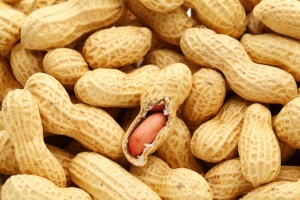Peanut-allergic and Soy-allergic Patients Can Safely Use Asthma Inhalers
 Information has been circulating that a lot of inhaled medicines for asthma also contain soy and that some children with peanut allergy can also cross react to that, implying that asthma inhalers may be dangerous for patients with peanut or soy allergies. Where did this idea come from? Is it true?
Information has been circulating that a lot of inhaled medicines for asthma also contain soy and that some children with peanut allergy can also cross react to that, implying that asthma inhalers may be dangerous for patients with peanut or soy allergies. Where did this idea come from? Is it true?
Ipratropium bromide is a bronchodilator medication used frequently for COPD (chronic obstructive pulmonary disease, mostly from smoking) and less often for asthma. The old formulations of two inhalers containing ipratropium, brand names Atrovent and Combivent, contained soy lecithin as an inactive ingredient and the product labeling warned that the medication should not be used in those with "hypersensitivity to soy lecithin or related food products such as soybean and peanut."
There have been a handful of reports in the medical literature of adverse reactions to these inhalers. In some cases, the authors of the reports speculated that the reactions were due to soy allergy because the inhalers contained soy lecithin. However, none of these reports demonstrated an actual allergy to the soy lecithin in the inhalers and in some cases, the patients were demonstrated to not be soy-allergic. Thus, despite the warning, there have been no substantiated reports of patients having any sort of adverse reaction to these inhalers because of soy or peanut allergy.
Lecithin is a fatty substance found in some plants. One of the sources of lecithin used in pharmaceutical agents is soybean oil. Patients who are allergic to foods, including soy and peanut, are allergic to proteins in the foods and are not allergic to the fats or oils in the foods. Soy lecithin may contain a trace amount of residual protein, however no allergic reactions have been demonstrated to be caused by this. Although peanuts and soybeans are both in the legume family, the overwhelming majority of peanut-allergic patients are not clinically allergic to soy, and even if they were, would not be expected to react to soy lecithin.
Many asthma inhalers used to contain chlorofluorocarbon (CFC) as a propellant. All inhalers containing CFC have been phased out because they are harmful to the environment. This includes the Atrovent and Combivent inhalers that contained soy lecithin. The new, currently available Atrovent and Combivent inhalers do not contain CFC and do not contain soy lecithin.
Thus, it appears that the concern regarding asthma inhalers and peanut or soy allergy is due to the combination of misperceptions explained above. The facts are:
• Most peanut-allergic patients are not allergic to soy.
• Soy lecithin does not contain enough soy protein to cause an allergic reaction even in soy-allergic patients.
• The inhalers in question were rarely used for asthma.
• The inhalers in question are no longer on the market.
• The currently available inhalers do not contain soy lecithin.
The bottom line: It is safe for patients with peanut allergy and soy allergy to use their asthma inhalers.
Find out more about asthma, food allergies.
10/31/2023